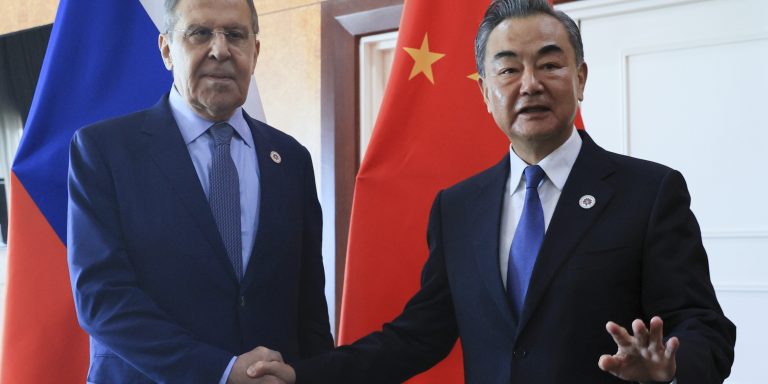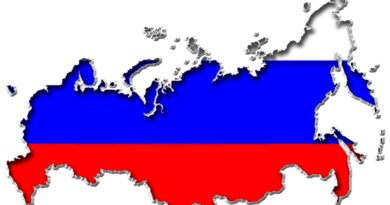IntelBrief: China Aids and Abets Russian Disinformation Efforts in …
Intelbrief / IntelBrief: China Aids and Abets Russian Disinformation Efforts in the Ukraine Conflict
February 23, 2023

Russian Foreign Ministry Press Service via AP
Bottom Line Up Front
- Throughout nine years of conflict in Ukraine, Russia has leaned heavily on disinformation as part of the war effort.
- Russian-backed/aligned disinformation campaigns and narratives have primarily sought to undermine support for Ukraine and amplify anti-US and anti-NATO sentiments on a global scale.
- With Chinese support for Russia showing increased strength of late – rather than abating – it seems likely that Beijing will also increase its support for Moscow through disinformation and influence campaigns.
- Western efforts to counter Russian and Chinese disinformation narratives related to Ukraine in regions outside of the United States and Europe, including in South America and Africa, have been met with limited success.
Since the Russian Federation’s invasion of Ukraine on February 24, 2022, Russia has leaned heavily on disinformation as part of the war effort. False or misleading narratives have been peddled online primarily to justify armed aggression, deflect and re-direct blame for atrocities committed by Russia, and undermine support for Ukraine globally, including by undermining NATO and Western influence. Other state actors, like the People’s Republic of China (PRC), have also sought to spread falsities about the ongoing war in Ukraine for their own political goals. The United States and the European Union (EU) have devised strategies and tactics to deal with the onslaught of false information percolating online, including efforts such as “pre-bunking” measures and instituting new analytic techniques.
A recent report by the European External Action Service’s (EEAS) Stratcom (Strategic Communications) division noted that among a sample of observed Foreign Information Manipulation and Interference (FIMI) activity between October and December 2022, an astonishing 60 percent of the FIMI activity was assessed as motivated by supporting Russia’s full-scale invasion of Ukraine. The report also noted the use of key tactics, including the use of multiple languages, videos, and images, as well as impersonating legitimate news sources, to mislead online audiences, known as media spoofing. In September 2022, Meta announced that it disrupted an extensive Russia-backed network on Facebook, which was impersonating European news outlets to spread pro-Kremlin narratives about the war in Ukraine. Some of the most concerning types of disinformation narratives observed over the past year are those that allege Ukraine is planning “false flag operations,” including using dirty bombs or chemical weapons against Russian forces. Such false narratives could be utilized by Kremlin-backed/aligned actors to justify Russian atrocities. In addition, documented efforts by the Kremlin and Kremlin-backed/aligned users to utilize propaganda, disinformation, and conspiracy theories to dehumanize the Ukrainian people and dispute the nationhood and sovereignty of Ukraine are cause for particular concern, as this tactic has been used historically to preempt or justify genocide.
Russian-backed/aligned actors have also seized on the war in Ukraine to deploy disinformation campaigns and narratives to a global audience to undermine support for Ukraine and amplify anti-US and anti-NATO sentiments. Aggressive influence campaigns throughout the Global South, including in sub-Saharan Africa, have been seemingly effective based on support for Moscow in several African capitals. These efforts frequently involve diplomats amplifying false or misleading narratives through official channels and social media accounts, framing sanctions on Russia as damaging the global economy, deflecting blame for the global food crisis, and portraying the United States and NATO as the aggressors of the war. While Putin and the Kremlin have used the false justification of “De-nazifying” Ukraine as a pretext for war, anti-Semitic conspiracy theories and disinformation narratives have been amplified to Western audiences online. False claims about the “Global Cabal” utilizing Ukraine as a human trafficking hub and Putin serving as the “savior” of human trafficking victims in Ukraine plays into existing anti-Semitic conspiracy theories common on far-right extremist online forums. Not only do such false narratives distort the very real tragedies of human trafficking in a conflict zone and complicate the work of aid organizations seeking to combat it, they also nefariously deflect from reports of Russia abducting Ukrainian children from occupied territories in Ukraine.
One disturbing trend that has been further crystalized in 2022 is efforts by PRC-backed/aligned actors to peddle disinformation, including Kremlin-seeded disinformation, for their own political gain. Soon after Russia’s February 2022 invasion, the Chinese Communist Party deployed its powerful censorship apparatus to suppress anti-war voices while amplifying pro-Russian conversations online. The Chinese Communist Party and allies have also peddled anti-US conspiracy theories, including the Kremlin-seeded stories about “US secret biolabs” being operated in Ukraine. English-language state-backed media outlets in China, like The Global Times, have spread anti-US propaganda seeking to portray NATO as a war-mongering organization and the EU as a puppet of the United States. With Chinese support for Russia showing no signs of abating, it seems likely that Beijing will also increase its support for Moscow through disinformation and influence campaigns.
These disinformation efforts by the CCP should be considered within the broader context of the strategic competition between the PRC and the United States, and Chinese efforts to position itself as an attractive alternative to the US-led world order. Such sentiments were on full display during PRC top diplomat Wang Yi’s speech at the Munich Security Conference last week, where he announced that President Xi will soon unveil his peace proposal for Ukraine, something he urged European leaders to consider while insinuating that “some actors” (largely interpreted as the US) do not want peace due to possible “strategic goals larger than Ukraine itself.” Wang then continued onwards to Moscow, where he met with Russian Foreign Minister Sergey Lavrov on February 22, amidst US intelligence warnings that the CCP could seek to supply Russia with “lethal support” for the war in Ukraine (the CCP has disputed this). Still, while in Moscow, China’s top diplomat described Sino-Russian ties as “rock solid.”
Russia’s war in Ukraine has illustrated that disinformation, conspiracy theories, and misleading information are integral to the Kremlin’s war efforts. Other states, especially China, are supporting Russia while also focusing on protecting their respective national interests and existing spheres of influence. The United States and the EU have devised strategies and tactics to deal with the onslaught of false information percolating online. US and European allies have moved fast to declassify intelligence in attempts to pre-bunk Russian disinformation and defang falsities before they gain traction online. The Global Engagement Center at the US Department of State published reports, fact sheets, and disinformation dispatches in 2022, highlighting the Kremlin’s disinformation efforts and disputing false narratives about Ukraine.
In early February, the EU announced it will launch a new monitoring and analysis platform, the Information Sharing and Analysis Center, to counter disinformation campaigns by Russia and China. Still, reports and government officials have highlighted that efforts to counter Russian and Chinese disinformation narratives related to the Ukraine war in countries outside the US and Europe, including in South America and Africa, have had limited success. With Putin showing no indication of ceasing hostilities, it will be crucial for the West to continue refining its approach to countering disinformation about the war in Ukraine.
This article has been archived for your research. The original version from The Soufan Center can be found here.


